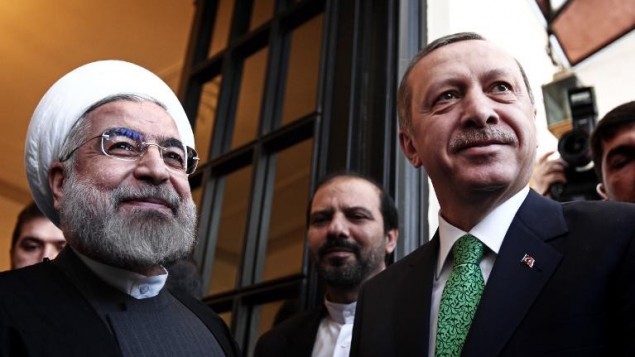Erdogan’s climb-down/Turkey’s moves could mean an important shift in Syria
Michael Young/Now Lebanon/June 30/16
The attack against Istanbul’s airport earlier this week overshadowed a significant move by the Turkish government that highlighted the failure of its Syria policy: President Recep Tayyip Erdogan apologized to Russia for the death of a Russian pilot whose aircraft was shot down last November by Turkey.
This came as Turkey also mended ties with Israel, another step back from Erdogan’s pro-Arab posturing several years ago. This may lead to lucrative gas deals, allowing Israel to send gas to Europe via a pipeline to Turkey, once it is built. In other words the reconciliation is hardly a timorous, temporary step.
However, it was Erdogan’s efforts to patch up his relationship with Russia, Bashar al-Assad’s main backer, and to refer to the country as a “friend and strategic partner,” that represented a climb-down of major proportions. It effectively underlined that the regional coalition against Assad has disintegrated.
That’s not to say that Turkey has abandoned those fighting the Syrian regime, but rather that other priorities have now taken over in a country that has been almost entirely focused on Syria in recent years. The Turks now must turn to other pressing issues, above all the Kurdish question, but also the difficult economic situation that the rift with Russia exacerbated, and that the reopening of contacts with Israel may help allay.
Nor is Erdogan alone. The second pillar of the anti-Assad coalition, Saudi Arabia, has similarly drifted away from Syria. Prince Mohammad bin Salman is seeking to reorient the Saudi economy away from dependency on oil, and has cut spending across the board. Consequently, Riyadh’s attention to Syria has dwindled, a trend only reinforced by the stalemate in Yemen.
To many Arab countries the situation in Syria has reached a point where the prevailing interest is bringing the conflict to an end, not scoring strategic points. This mood was already visible when Egypt and Jordan soured on the conflict, shifting their attitudes toward the anti-Assad opposition. By the start of this year the Arab coalition against Assad existed only in name.
Assad and his backers can take pleasure in the fact that their destructive policies during the past five years have virtually ensured that the Syrian regime will remain in place. All those who aligned against him, whether inside the region or outside, have more or less given up the fight, even if the result is chaos.
That hardly means that the war in Syria is over, but it has reached a state of pointlessness. Assad’s future is no longer on the table, as the breakdown in the Geneva negotiations has made clear. The ISIS challenge has spawned new dynamics, leading the United States to back Kurdish forces in Syria whose successes threaten Turkey. Russian intervention, though utterly barbaric in places, has not harmed its diplomatic relations with a majority of Assad’s foes. In other words, all developments have served to reinforce the Syrian president’s position.
Assad’s only problem is that he doesn’t have the manpower to regain the territory that his regime lost. Everywhere his army is struggling, and the willingness of his Iranian-backed Shiite allies to go all the way on his behalf is not guaranteed. For instance, despite Hassan Nasrallah’s statements last week to the contrary, unconfirmed reports indicate that Hezbollah has told the Syrian regime that it refuses to spearhead the recapture of Aleppo, fearing it would lose too many men in the battle.
The silver lining in this story of bloody deadlock is that it may facilitate a solution in Syria. However, that is not likely soon since Assad’s enemies, even if they have been weakened, are not about to give up on their demands that he leave office. There are tens of thousands of armed men, probably more, in Syria who will not suddenly cease fighting the regime and go home. No one can win the war, but no side will admit it cannot.
But with Erdogan’s apology to Russia wider spaces have been created for diplomacy. The Saudis, trapped in Yemen, have an incentive to participate in a new round of talks over Syria. The challenge is to persuade them to do so with Iran in attendance, and to find a way to de-escalate the toxic Saudi-Iranian rivalry.
It’s improbable that Geneva will be formally abandoned as a framework for discussion, which is why such talks should be conducted quietly to work out an amended arrangement. Assad may be poison, but to many countries Geneva could be turning into an obstacle to an agreement. A more ambiguous framework, where Assad’s fate is left vague, may be preferable.
As Syria’s most powerful neighbor, Turkey was always the linchpin of the anti-Assad coalition. Erdogan has effectively retreated on Syria, and the Istanbul airport attack will have only persuaded him he is right in doing so. The war in Syria will continue, but with Turkey possibly neutralized, the template of the war for the past five years has been decisively changed.
***Michael Young is a writer and editor in Beirut. He tweets @BeirutCalling.
Turkey’s Istanbul Attack Vengeance Will Be Like ‘Rain From Hell’
Soner Cagaptay/he Washington Institute/CNN/June 30/16
















